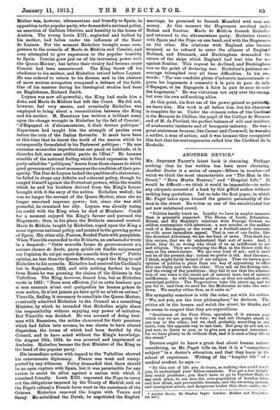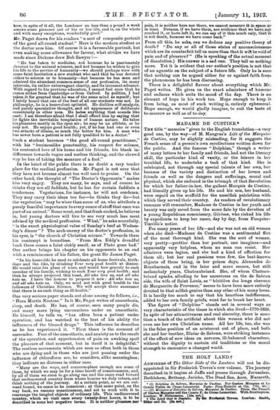ANOTHER DEVICE.* Mn. STEPHEN PAGET'S latest book is charming. Perhaps
nothing that he has written has been more charming. Another Device is a series of essays—fifteen in number—of which we think the most characteristic are "The Man in the Street," " Hora Mortis Nostrae," and "Hospital Life." It would be difficult—we think it would be impossible—to write any adequate account of a book by this gifted author without making long quotations. Let us take the first paper, in which Mr. Paget takes upon himself the generic personality of the man in the street. He writes as one of the uncultivated but not now unlettered crowd.
"Politics hardly touch us. Loyalty we have in ampler measure than is generally supposed. The House of Lords, Education, Ritual, and His Majesty's relations with Foreign Powers we seldom contemplate with attention : a new murder, or the sudden rush of a fire-engine, or the event of a football-match interests us with more immediate appeal. That is one of our faults : like the decadent Athenians, we are too fond of news. This fault has this excuse, that we do understand that sort of news. And, I think, they do us wrong who think of us as indifferent to art and religion. They are confusing the Man in the Street with the man at the street-corner. We are very fond of art ; and it need not be of the present day : indeed we prefer it old. And the same, I think, might fairly be said of our religion. That we have a poor opinion of politics is plain from our way of appointing to office first one Party and then the other. They call us the flowing tide, and the swing of the pendulum : they fail to see that the alterna- tion of our votes is the result not of natural laws, but of natural indifference. As with Imperial politics, as they are called, so with municipal politics. The Progressives take the street up, and we pay for it ; and then we send for the Moderates to take the rates down. We employ either firm, as it suits us."
His sympathy somehow is with the voter, not with his critics.
"We, not you, are the true philosophers," he declares. The critics sit in the houses and watch the street, he thinks, and he seems to suspect that they are supercilious.
"Gentlemen of the First Floor, speculate, if it amuses you, which way we are going to vote : we had not thought about it, one way or the other ; but we shall probably, according to our habit, vote the opposite way to last time. But pray do not ask us, just now, to listen to you, or to give you a personal interview : for we have plenty to do without that, and it is such a busy life in the street."
Doctors ought to know a great deal about human nature considering, as Mr. Paget tells us, that it is a "compulsory subject" in a doctor's education, and that they learn in 64 school of experience. Writing of the "hospital life" of a
medical student he says :—
" Ey this sort of life you do learn, as nothing else could teach you to understand your fellow-creatures. You get a fair insigliP into social problems ; you don't have to go to Toynbee Hall, or any such place, to see how the over-population of London lives, and how drink, and preventible diseases, and the sweating system,
and immigrant aliens, and dangerous trades thin their ranks; '
• Ali-other Darit..e. By Stephen Paget. London: Hodder and Stotyshton. [Se. net.]
how, in spite of it all, the Londoner on less than a pound a week screws seine pleasure out of his or her life, and is, on the whole and with many exceptions, wonderfully good."
Mr. Paget draws for his readers "a sort of composite pertrait
of the good all-rotind student." Here is the modern student as the doctor sees him. Of course it is a favourable portrait, but even making some allowance for favour, what strides we have made since Dickens drew Bob Sawyer "He has taken to medicine, not because he is passionately devoted to the natural sciences, and not because he wishes to give his life to the service of humanity—we should perhaps view with some faint hesitation a new student who said that he was devoted either to science or to humanity—but because he has seen and admired the abundant common-sen.se of our profession, its many interests, its rather extravagant charity, and its incessant advance. With regard to his previous education, I cannot feel sure that he comes either from Cambridge or from Oxford. In politics, I had taken it for granted that he was of the same mind as myself; but I lately heard that one of the best ef all our students was not. In philosophy, he is a benevolent optimist. He dislikes self-analysis, and purely speculative thought, and all appearance of deliberate eccentricity in other men. He hates anything that sounds like cant: I am therefore afraid that I shall offend him by saying that he fights the inevitable temptation of human nature. He takes his pleasures mostly in the open air; he may be an athlete, or he may not. He enjoys good health; yet, if he has had ono or even two attacks of illness, so much the better for him. A man who has flavor been a patient is not fully qualified to be a doctor."
Such a student becomes "the good all-round practitioner," -with his " businesslike punctuality, his respect for science, his contented love of his home and his friends, his blank in- difference towards vague and useless thiriking, and the shrewd way he has of taking the measure of a fool."
In the heart of the public there is no doubt a very tender place for the medical profession. Mr. Paget is not sire that they have not become almost too well used to praise. On the other hand, the thought of "The Doctor's Opponents" makes him very angry. They are many, he says, and of course he thinks they are all faddist, but he has for certain faddists a
tenderness. Vegetarians, for instance, he will not condemn. They may carry their ideas too far—he thinks they do—but the vegetarian "may be wiser than some of us, who attribute a
purely fanciful importance to every ounce of stuff that once was part of an animal." Some meat, and that fresh cooked, lie believes in, but young doctors will live to see very much less meat advised by the medical profession. "What," he asks scornfully, "is the exact physiological value of Sunday's beef at Wednes- day's dinner" ? The arch-enemy of the doctor's profession, in his eyes, is "the church of Christian science." Towards them his contempt is boundless. "From Mrs. Eddy's dreadful book there comes a faint sickly smell, as of Plato gone bad." Our author brings his chapter on his opponents to an end with a reminiscence of his father, the great Sir James Paget.
"In his homarlife he used to celebrate all home festivals, birth- days and the like, by drinking Your very good health at dinner. He would raise his glass of wine, and would bow gravely to each member of his family, wishing to each Your very good health ; and then he always proposed this toast, All who love IA and all who hate us. I have the honour to propose it now : All who love us, and all who hate vs. Only, we need not wish good health to the followers of Christian Science. We will accept their assurance that there is no such thing as ill-health."
One very serious paper stands out alone among its fellows, i.e., " Hora Mortis Host-res." In it Mr. Paget writes of anaesthesia, sleep, and death. He has, of course, seen many people die, and many more lying unconscious under an anaesthetic. He himself, he tells us, "has often been a patient under operation, and has watched to the best of his ability the influences of the blessed drugs." This influence he describes as he has experienced it. "First there is the moment of surrender. Fear of the anaesthetic, and anxiety as to the result of the operation, and apprehension of pain on awaking spoil the pleasure of that moment, but in itself it is delightful." The restless movements which are seen so often both in those who are dying and in those who are just passing under the influence of chloroform are, he considers, alike meaningless; they indicate no distress in either case.
"Many are the ways, and common-place enough are some of them, by which we may be for a time bereft of consciousness; and, by all of them we seem to go along one and the same road toward that undiscovered country from whose bourne we duly return, and think nothing of the journey. At a certain point, as we are out- ward bound, we cease to be conscimia ; at that same point, on the way back, we resume consciousness, and set to work with it to rearrange the tangled objects of ordinary life. This undiscovered country, which we visit once every twenty-four hours, is to be described in none but negative terms. It is neither pleasure nog
pain, it is neither here nor there, we cannot measure :Bin image Or in time. Dreams, if we have them, are evidence that we have,nqt reached it, or have left it; we can say of it this much only, that it is not death, because we have come back."
From all this, he asks, can we deduce any positive theory. ef death ? "Do any or all of those states of nnconeciousneaa- which are its counterfeit tell us more than that it will be void Of pain and of pleasure ? " (He is speaking of the actual moment of dissolution.) His answer is a sad one. They tell us nothing.
more. Yet it is evident that our author's position is not that of an agnostic on the subject of a future life. Only be is sure. that nothing can be argued either for or against faith from the phenomena he has been discussing.
There is a delightful flavour about everything which Mr. Paget writes. He gives us the exact admixture of humour- and sadness which suits the mood of the day. There is an element of hope in his work too. Hope enough to keep it from being, as most of such writing is, entirely ephemeral Hope enough, we would gladly imagine, to suit the taste of to-morrow as well as of to-day.











































 Previous page
Previous page